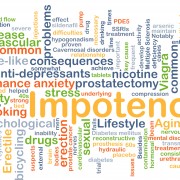8 Ways To Prevent ED
ED affects 40% of men older than 40 and 70% of those over 70
– but few seek help.
If you assess the number of ads promoting drugs that treat erectile dysfunction, or ED, you might believe that modern medicine has revolutionized men’s sexual performance, improved couples’ romantic lives and all but eradicated a disorder that was once only whispered about.
However, what the promotional material for drugs like Viagra tend to leave out is that ED has a much darker side:
It can herald cardiovascular trouble.
This is disturbing. ED – defined as the inability to achieve or maintain erection for satisfactory sexual intercourse – is so common (over 40% of those over 40, and 70% over 70) yet relatively few men seek help for this and are therefore not being diagnosed with potential heart problems.
ED, It’s Not All in Your Head
Stress frequently is blamed for most cases of ED, hence the sometimes erroneous assumption that once the demands of modern life subside, “things” will invariably get back to normal. While anxiety, depression and stress can all contribute to it can also signal the presence of more ominous medical conditions, including pelvic trauma, nervous system disorders and diseased arteries.
Complicating matters further, ED often stems from several factors, and determining the main driver can be challenging. For example, a history of sexual frustration caused by an underlying organic disorder can lead to feelings of anxiety in subsequent sexual encounters, fuelling a vicious feedback loop.
E.D. and Your Heart
Vascular ED stems from poor blood flow inside arteries that have been hardened and narrowed by the build-up of fat and calcium deposits – a condition known as atherosclerosis, the main culprit behind heart attacks and strokes. Another cause of vascular ED is a condition known as endothelial dysfunction, which is marked by the inability of blood vessels to relax properly. The condition is caused by the insufficient release of an all-important chemical called nitric oxide, which is needed for blood vessel relaxation, the underlying mechanism of erection. Smoking, lack of physical activity, obesity, diabetes, high blood pressure and high cholesterol fuel both atherosclerosis and endothelial dysfunction. This is why vascular ED can often signal the presence of processes that also lead to heart attack and stroke.
A 2013 Australian study of 95,000 men with no known heart problems found that those with severe ED had a 60 percent higher risk of developing heart disease and nearly twice the risk of dying compared with those without ED. Other studies have reaffirmed these findings. Research published earlier this year also showed a link between ED and dementia, a condition that often stems from diseased blood vessels in the brain.
Experts estimate that more than 40 percent of men with ED and risk factors for cardiovascular disease are unaware of their heart risk.
Because of the shared risk factors with cardiovascular disease, a diagnosis of vascular ED can signal the presence of atherosclerosis in other vessels, including the arteries of the heart. And the presence of atherosclerosis in those vessels boosts the risk of heart attack or stroke.
Thus, a diagnosis of vascular ED should be heeded as a warning bell, an alarm signalling there may be something wrong in the arteries.
If you already have ED.
Tell your doctor.
Social progress notwithstanding, ED still carries a stigma that can deter some men from discussing this problem. Let your doctor know about it, after all, there’s more at stake than your sex life. Your doctor will help determine the underlying cause of ED and, if necessary, refer you to a specialist for treatment.
A culprit in the medicine cabinet?
Some medications used to treat depression and high blood pressure can cause or exacerbate ED. Certain drugs used to treat heart disease, called nitrates, can make for a dangerous mix when used with an ED medication, as the combination can lead to a precipitous drop in blood pressure.
Get screened for heart disease.
ED may be the very first warning sign of cardiac trouble, even in the absence of other heart-related symptoms. Men with ED and no obvious causes, such as pelvic or neurologic disease, should be evaluated for underlying heart disease before starting ED treatment.
8 Ways to Promote Healthy Erectile Functioning.
1. Quit smoking. Smoking worsens the function of the cells that line the walls of the arteries, and inflammation contributes to atherosclerosis. Nicotine causes blood vessels to constrict, which can reduce blood flow to the penis.
2. Exercise regularly. Physical activity can reduce cardiovascular risk, lower stress and improve blood flow.
3. Eat your way to a healthier heart and better sex life. The same diet that is good for the heart can also prevent ED. Opt for a menu rich in fruits, vegetables, lean protein and legumes, and low in processed and fatty foods.
4. Maintain normal body weight. Being overweight can cause or worsen ED. Having a waist circumference above 40 inches is associated with lower testosterone, the main male sex hormone.
5. Control blood pressure and cholesterol levels. These factors are not merely harbingers of heart attack and stroke – they can also cause sexual dysfunction.
6. If you have diabetes, keep your blood sugar in check. At least half of men with diabetes experience ED symptoms. Controlling blood sugar can help prevent ED and improve symptoms in men who already have ED.
7. Limit alcohol. You might think that alcohol might get you in the mood, but overindulging can limit sexual performance.
8. Manage anxiety and stress. Talk to your doctor about healthy ways to manage stress and boost mental health. Consider seeing a mental health expert if things don’t get better.
For a confidential chat on the phone
please call Christina on 0435 438 899


![content[1]](http://enhancingdesire.com.au/wp-content/uploads/2015/07/content1-180x180.jpg)

